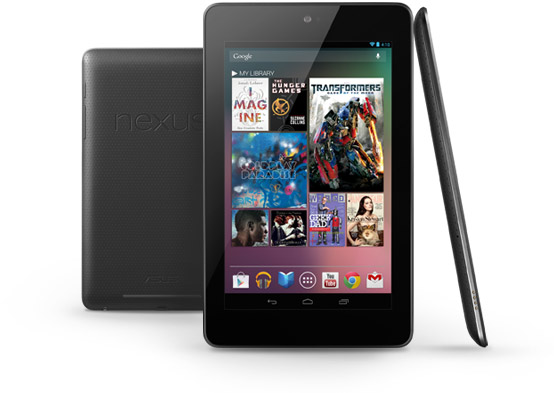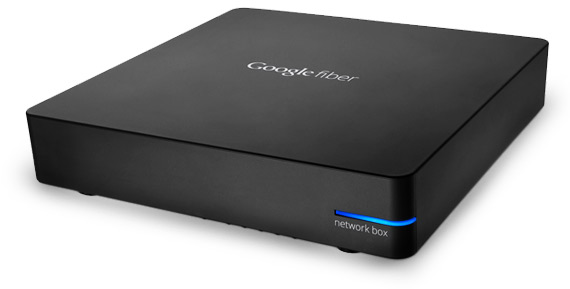 Google Fiber, which is launching service in Kansas City, Kan. and Kansas City, Mo., will offer consumers a "free" broadband access services, offering downstream speeds up to 5 Mbps, with a 1Mbps upload speed, with free service guaranteed for at least seven years.
Google Fiber, which is launching service in Kansas City, Kan. and Kansas City, Mo., will offer consumers a "free" broadband access services, offering downstream speeds up to 5 Mbps, with a 1Mbps upload speed, with free service guaranteed for at least seven years.Users have to pay a one-time $300 "construction fee," optionally payable in 12 monthly payments of $25), plus applicable taxes and fees.
The "standard" symmetrical 1 Gbps upload and download service, with no data caps, requires a one-year contract and costs $70 a month, plus taxes and fees.
The "entertainment television and 1-Gbps service costs $120 a month, and includes a number of standard video channels. The nominal pricing of the video service is $50 a month. A number of the leading networks, including ESPN, Disney and Fox channels are unavailable at that price.
But Google Fiber at launch will be a "beta" in some ways, so programming line-ups might change, over time.
 The standard package also includes a free Nexus 7 tablet, though, at least in part because the tablet provides remote control features, as well as the ability to eamlessly watch on your tablet in other rooms of a customer's house.
The standard package also includes a free Nexus 7 tablet, though, at least in part because the tablet provides remote control features, as well as the ability to eamlessly watch on your tablet in other rooms of a customer's house.Of course, users who want broadband access and television will have three different boxes, one for broadband, one for TV decoding, and a third to provide digital video recorder functions.
There are some ways in which the Google video service offers advantages. There is no separate box or fee for HDTV viewing, for example. Many service providers charge extra for DVR functionality as well. Google video service does not have those add-on fees.
- 3Net
- A&;E
- Action Weather
- Animal Planet
- Antenna TV
- Bandamax
- BET
- BET Gospel
- Biography Channel
- BlueHighways TV
- Bounce TV
- Bravo
- C-SPAN
- C-SPAN 2
- C-SPAN 3
- CBS Sports Network
- Centric
- Chiller
- cloo
- CMT
- CMT Pure Country
- CNBC
- CNBC World
- Comedy Central
- Cooking Channel
- Create
- Crime & Investigation Network
- Current TV
- De Pelicula
- De Pelicula Clasico
- Destination America
- Discovery
- Discovery en Espanol
- Discovery Familia
- Discovery Fit & Health
- DIY
- E! Entertainment
- Encore
- Encore Action
- Encore Drama
- Encore Espanol
- Encore Family
- Encore Love
- Encore Suspense
- Encore Westerns
- Flix
- Food Network
- FOROTv
- G4
- GAC
- Galavision
- Game Show Network
- Golf Channel
- H2
- Hallmark Channel
- Hallmark Movie Channel
- Halogen
- HGTV
- History
- IndiePlex
- INSP
- Investigation Discovery
- ION Life
- KCPT (PBS)
- KCTV 5 (CBS)
- KCWE 29 (CW)
- KMBC 9 (ABC)
- KMCI 38
- KPXE 50 (ION)
- KSHB 41 (NBC)
- KSMO 62
- KUKC 48 (Univision)
- La Familia Cosmovision
- Lifetime
- Lifetime Move Network
- Lifetime Real Women
- Live Well
- LOGO
- MeTV
- MGM
- Military Channel
- Military History
- MLB Network
- MoviePlex
- MSNBC
- MTV
- MTV Hits
- MTV Jams
- MTV tr3s
- MTV2
- MTVU
- mun2
- NASA
- NBC Sports Network
- NFL
- NFL Redzone
- NHL
- Nick 2
- Nick Jr.
- Nickelodeon
- Nicktoons
- Olympics Channel 1
- Olympics Channel 2
- Outdoor Channel
- OWN
- Oxygen
- Palladia
- PBS Encore
- PBS Kids Sprout
- qubo
- QVC
- REELZChannel
- RetroPlex
- Ritmoson Latino
- Science channel
- Sho2
- Showtime
- Showtime Beyond
- Showtime Extreme
- Showtime Family Zone
- Showtime Next
- Showtime Showcase
- Showtime Women
- Smithsonian
- Spike TV
- Sportsman Channel
- Starz
- Starz Cinema
- Starz Comedy
- Starz Edge
- Starz in Black
- Starz Kids and Family
- Style!
- SyFy
- TBN Enlace
- Teen Nick
- Telefutura
- Telehit
- Telemundo
- Tennis Channel
- The History en Espanol
- The Hub
- This TV
- TLC
- TMC Extra
- TMC: The Movie Channel
- Travel Channel
- TV Land
- TVG
- Universal
- Univision Deportes
- Univision tlnovelas
- USA Network
- VH1
- VH1 Classic
- VH1 Soul
- WDAF 4 (FOX)
- WealthTV
- Weather channel
- WGN
- Youtoo TV

